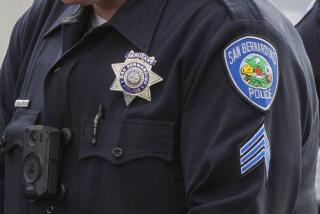Heckling Fear Kept Officer From Aiding King : Trial: Highway patrolwoman fights back tears as she recounts how motorist laid on ground bleeding. She decided against assisting him, she says, after seeing other officers ‘joking around.’
- Share via
A California Highway Patrol officer testified Monday that she declined to give medical help to a hogtied, bleeding Rodney G. King after his beating because she did not want to be heckled by a group of joking officers.
Officer Melanie Singer, a defense witness whose testimony last week was seen as damaging to the defense, fought back tears as she recounted seeing King lying in the dirt moments after policemen beat him March 3, 1991.
“There was blood dripping literally from his mouth, and there was a pool of blood beneath his chin,” said Singer, under cross-examination from Assistant U.S. Attorney Alan Tieger.
Singer said she started to reach for her gloves to give medical aid to King but decided against it after seeing other officers nearby “joking around.”
“I didn’t want them to heckle me,” she said.
Under questioning from defense attorneys, she acknowledged that she could not identify the officers or whether they worked for the Los Angeles Police Department or other agencies.
She also said she did not know if they included any of the four men on trial in federal court on charges of violating King’s civil rights in the videotaped beating. They are LAPD Sgt. Stacey C. Koon, officers Laurence M. Powell and Theodore J. Briseno and former officer Timothy E. Wind.
Singer said the scene bothered her.
“I just couldn’t understand why they were just standing around while this man is lying here,” she said.
Although called by Powell’s attorney, Singer repeated her testimony from Friday that Powell struck King in the head as the motorist was on the ground. The defense contends that King received glancing blows at most.
“There is no doubt in my mind that he struck him in the face,” she said, her voice choking. “I will never forget it until the day I die.”
Similar testimony Friday prompted Briseno’s lawyer, Harland Braun, to say he could not understand why Singer was called as a defense witness.
Singer also disagreed with the defense characterization that King appeared to be under the influence of the drug PCP, saying he showed none of the classic signs such as a trance-like stare or profuse sweating.
Powell’s attorney, Michael Stone, continued to try to discredit his own witness. For instance, he showed her a segment of videotape in which she is seen watching the beating, even though she testified that she had no memory of that portion of the beating.
Later, a police supervisor testified that a prosecution witness was wrong to say that Los Angeles Police Department policy strictly forbids any delay in a physician-ordered transfer of a suspect to a hospital.
Lt. Lindsay Brummel said the department performed an audit after Sgt. Michael Schadel’s testimony March 12 and found that police commonly perform so-called remote bookings before taking suspects to the hospital, as Powell and Wind say they did with King.
Such a procedure, done on a computer, actually saves time, he said. “It’s absolutely the best way of doing business,” he said.
Under cross-examination from Assistant U.S. Attorney Barry Kowalski, Brummel said the process takes an average of 15 minutes. Wind and Powell spent more than an hour at the station where, prosecutors claim, they told war stories about the King beating.
“(They) would have a lot of time to tell war stories?” Kowalski asked.
A defense objection to the question was sustained by the judge, and Kowalski ended his cross-examination.
In other testimony, retired Sheriff’s Deputy Charles Groniga quoted King as saying a day after the beating, “They said I was evading arrest, but I was really resisting arrest and I got beat up.”
Groniga, then a bus driver, drove King from the hospital to jail.
More to Read
Sign up for Essential California
The most important California stories and recommendations in your inbox every morning.
You may occasionally receive promotional content from the Los Angeles Times.













